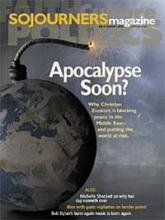"That's when I want you—you knower of my emptiness, you unspeaking partner to my sorrow. That's when I need you, God, like food," wrote Rainer Maria Rilke in his Book of Hours. Rilke's intense hunger for God is one known and expressed throughout our faith tradition, from the Israelites' walk to freedom, to Jesus. We will see examples in the coming weeks of food imagery; more important, we will know God's continuous invitations to the banquet. From Elijah, who promised that "they shall eat and there shall be some left over" (2 Kings 4:43) to Jesus, God always provides extra. In some of the most powerful writings of the New Testament, John describes the embodied God as our only source of nourishment and true life. In Christ our deep hunger and loneliness is fully satisfied: "I am the living bread that came down from heaven; whoever eats this bread will live forever" (John 6:51).
Paul insists that our experiences of God move beyond thinking into being, to "know the love of Christ that surpasses knowledge" (Ephesians 3:17-19). We are invited to take the food God offers, including Christ, as more than symbol: real food for our real bodies. The invitation, however, is just that. Both Joshua and Jesus emphasize that the covenant is a free agreement between two parties. It seems that God is not interested in anything but our authentic choice to be in relationship. Like Joshua, we can choose freely: "As for me and my household, we will serve the Lord" (Joshua 24:15).
Michaela Bruzzese is a free-lance writer living in Chile.
July 6
Prophets in Our Midst
Ezekiel 2:1-5; Psalm 123; 2 Corinthians 12:2-10; Mark 6:1-13
Read the Full Article
